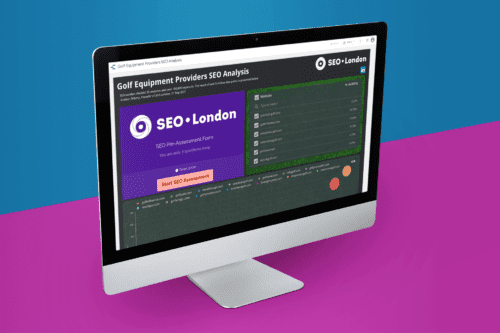Page URLs can affect search rankings. According to Moz, search engines evaluate them to determine the relevance to a user’s search query. When search engines visit your website, they’ll look at its page URLs. Creating search engine optimization (SEO)-friendly page URLs will encourage them to rank your website higher.
Include Titles in URLs
You should typically include titles in-page URLs. Don’t just create nondescript page URLs consisting of random letters and numbers. Instead, create descriptive page URLs that feature the respective page’s title.
Pages require titles. Whether it’s a product page, a blog post, or a contact form page, you’ll have to give it a title. You can use these duplicate titles to create SEO-friendly page URLs. If your website runs the WordPress platform, setting the permalinks to “Post name” will automatically include titles in the page URLs. WordPress will use the title you enter for a given page or post to create its URL.
Skip Unnecessary Words
Short page URLs typically perform better than long page URLs. According to Neil Patel, pages that rank in the first organic Google position have an average of 50 characters in their URL. The further down you scroll on Google, the longer the page URLs become. You can create short and SEO-friendly page URLs by skipping unnecessary words.
Some pages may have long titles. And if you use them to create page URLs, the page URLs will be just as long. However, for shorter page URLs, you may be able to skip unnecessary words like indefinite articles and conjunctions in long titles.
Only Use Lowercase Letters
It would be best to stick with lowercase letters when creating page URLs. It’s a common misconception that page URLs are case-insensitive. While domains are always case-insensitive, page URLs may be case-sensitive or case-insensitive.
Case sensitivity for page URLs depends on the server on which the pages are hosted. Some servers treat lowercase letters and uppercase letters in-page URLs as being different. If you create a page URL with uppercase letters, visitors won’t be able to load the page at the same URL but with lowercase letters. Instead, they’ll only be able to load the page by visiting the exact URL with the uppercase letters.
To err on the side of caution, avoid using uppercase letters in-page URLs; stick with lowercase letters to ensure accessibility—most visitors type page URLs in all lowercase letters. So as long as you create page URLs in all lowercase letters, they’ll be able to easily access your website’s pages, regardless of the server.
Separate Words With Hyphens
How do you deal with multiple words in page URLs? While you can’t include spaces in page URLs, you can consist of hyphens in them. For example, if the title of a page consists of four words, you can use two hyphens in its URL. For example, you place a hyphen between the first and second words and another hyphen between the third and fourth words to separate the words.
Page URLs support hyphens as well as underscores. From a visitor’s point of view, these special characters can create the perception of spacing between words. However, search engines have a different view regarding hyphens and underscore in-page URLs. They view hyphens as separators and highlights as joiners.
Google says web admins should use hyphens and not underscores in-page URLs in its website guidelines. According to Google, hyphens help its crawlers identify individual words. However, Google’s crawlers won’t distinguish between multiple words in-page URLs if you use underscores.
Omit Dates
Some webmasters include dates in their page URLs. Either manually or with the assistance of a content management system (CMS), they’ll consist of the date when a page was published in the page’s URL. Showing in-page URLs may not hurt your website’s SEO, but you may still want to avoid using them.
Page URLs with dates look messy. For example, a typical publish date of the year, month, and the day will add eight new characters to page URLs. You’ll create cleaner page URLs that both visitors and search engines prefer by omitting dates.
Show Hierarchy
Another tip for SEO-friendly page URLs is to show hierarchy. A directory path represents a hierarchy. For example, publishing a page in your website’s root folder won’t have any order. The root folder is the highest directory level, so pages published in it are all equal.
Conversely, publishing a page in a lower directory level will result in a hierarchy. For example, you can create folders for categories, after which you post pages in those folders. For pages published in lower directory levels such as this, you should show their hierarchy in URLs.
Many content management systems (CMSs) show hierarchy automatically in-page URLs. They don’t require any additional steps. For example, many CMSs will automatically add directory paths to page URLs if the pages have a hierarchy.
Avoid Trailing Slashes
Don’t include trailing slash in-page URLs. A trailing slash is nothing more than a forward slash appended to a URL. It’s placed at the end of a URL where it trails the rest of the URL.
Some websites used trailing slashes in URLs to indicate a directory in the past. For entire directories, they would create URLs with a trailing slash. For individual pages, they would develop URLs without a trailing slash.
Creating page URLs with a trailing slash may confuse search engines. Whether you use them for directories or individual pages, search engines will treat them as unique page URLs. They’ll assume the page URLs with a trailing slash are different from those without.
Stay Consistent
One of the most important things you can do when creating SEO-friendly page URLs is to stay consistent. Don’t experiment with different formats. Instead, after choosing a format, use it as the foundation for all page URLs on your website.
Using a combination of different formats will make your website difficult to navigate. And when you jump around from one URL format to another format, you may make typos in links. SEO-friendly page URLs require the same, consistent format.
They may not be as influential as content or inbound links, but page URLs can affect search engine visibility. Search engines use them as lightweight ranking signals. Creating SEO-friendly page URLs can complement your website’s overall SEO strategy while driving higher organic search rankings.
 Published in: May 2022
Published in: May 2022
Last Updated in 2022-12-28T09:36:04+00:00 by Lukasz Zelezny



